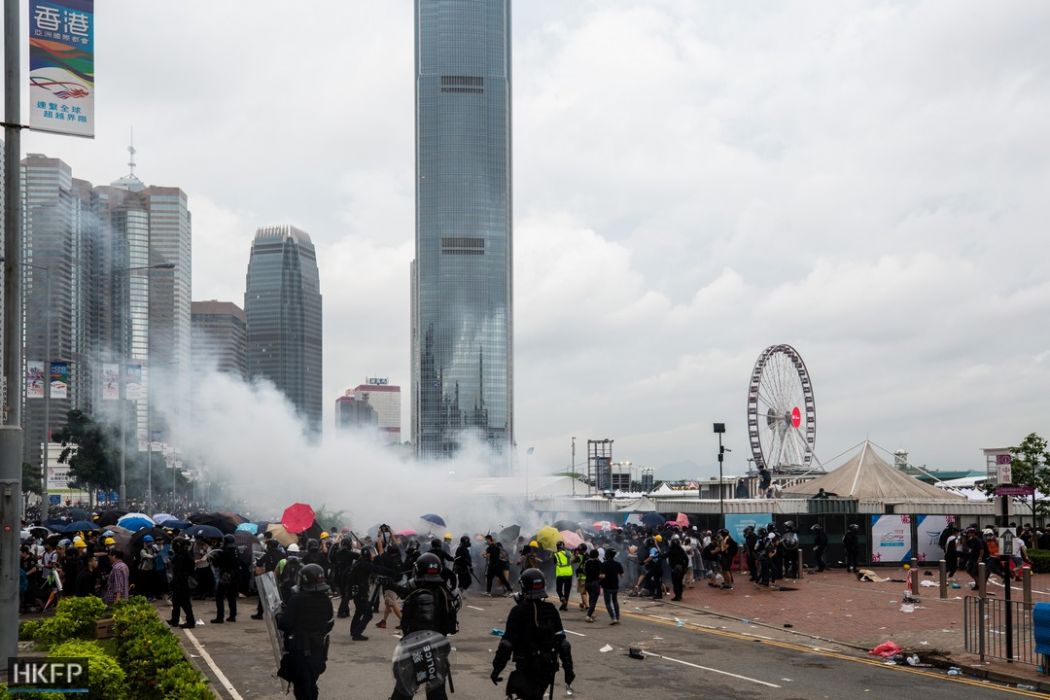For many Hongkongers and people watching around the world, June 12, 2019 marked the beginning of the city’s bitter resistance against authoritarianism – first against the extradition bill that would have eroded political and judicial freedoms and later against rampant police brutality, and a regime that resorts to violence and cannot be held accountable.
On that date, police fired canister after canister of teargas as they charged at unarmed protesters in full anti-riot gear, hitting some with rubber bullets and beanbag rounds. In subway stations and on the streets, officers randomly detained pedestrians and searched their bags. Little did we know at the time that a heavy public police presence and arbitrary detention and harassment would soon become the norm.

Since then, Hongkongers have experienced ongoing police violence, political repression, and the loss of safety and civil liberties under the National Security Law. As Beijing and the Hong Kong government intensify the suppression of free speech and censor any collective memories and events deemed subversive, it is all the more important to cultivate new rituals and communities to sustain our memories and spirit of resistance and resilience.
In addition to 6.12, numbers such as 6.15, 7.21, 8.31, 9.28, and 11.8 all hold significance for Hongkongers as we commemorate the deaths of Ling-Kit Leung (“raincoat man”), Tsz-Lok Chow, and the victims of police brutality and gang attacks.
While there was no evidence that police had killed civilians during the 8.31 incident in Prince Edward Station, Hongkongers set up shrines, flowers, and offerings there to commemorate the supposed victims. Each day, after government cleaners and anti-protest Hongkongers destroyed the shrine, volunteers would replenish and replace it, with elderly women folding and burning elaborate paper money there.

Anthropologist Sealing Cheng spoke about these mourners at a recent conference. For her and for many Hongkongers who had mourned at these fleeting shrines, to grieve collectively is to protest. While the police barred and fined people for laying flowers outside Prince Edward Station, their repression only strengthened peoples’ commitment to remember these events.
As one person noted: “If they don’t let us lay down flowers, we can still hold them and pass by to remember what happened.” This message exudes a sense of resilience and ingenuity: the regime may repress dissent and threaten Hongkongers with violence and jail time, but people will always invent new ways to sustain relationships to each other and to collective memories.
Indeed, even after their removal, the shrines – along with various sites of police brutality and deaths across the city -serve as material reminders not only of political repression and violence, but also of collective resistance and dissent among Hongkongers.

Last September, after the passage of the National Security Law which stifled all demonstrations, some discovered that the street view on Google Maps continued to show images from the height of the anti-extradition protests. In a few images, the white flowers outside Exit 1B of Prince Edward station were clearly visible.
In addition to the shrine, Google Maps also captured Lennon Walls and protest slogans that were graffitied on footbridges and walls. While these images, like the actual artifacts, are only temporary, they nevertheless attest to the staying power of the protests. The cityscape has become a palimpsest of Hongkongers’ collective memories and struggles. One can no longer walk through Yuen Long, Yau Tsim Mong, Central, the campuses of CUHK and PolyU, and so many other places in the city without feeling a pang.
The government may remove more books about democracy from library shelves and censor more content in the classroom, but it cannot entirely erase the new relationships which Hongkongers have developed with the city, with the regime, and with each other.

Despite the implementation of the security law, the mass arrest of dissenters, and the overhaul of the electoral system – all of which erode hopes for electoral democracy – Hongkongers have continued to engage in new forms of community-building and resistance.
In spite of the pandemic they still support the yellow economic circles, while ViuTV and ERROR’s recent rise in popularity also signal Hongkongers’ appreciation of and commitment to entertainment that is socially conscious. The fight we began on June 12, 2019 is not over yet. It has just taken a different form – integrated into the everyday life of Hongkongers in subtle but expansive ways.
Support HKFP | Policies & Ethics | Error/typo? | Contact Us | Newsletter | Transparency & Annual Report | Apps
| HKFP is an impartial platform & does not necessarily share the views of opinion writers or advertisers. HKFP presents a diversity of views & regularly invites figures across the political spectrum to write for us. Press freedom is guaranteed under the Basic Law, security law, Bill of Rights and Chinese constitution. Opinion pieces aim to point out errors or defects in the government, law or policies, or aim to suggest ideas or alterations via legal means without an intention of hatred, discontent or hostility against the authorities or other communities. |
Help safeguard press freedom & keep HKFP free for all readers by supporting our team

More HKFP OPINION:
HKFP has an impartial stance, transparent funding, and balanced coverage guided by an Ethics Code and Corrections Policy.
Support press freedom & help us surpass 1,000 monthly Patrons: 100% independent, governed by an ethics code & not-for-profit.










